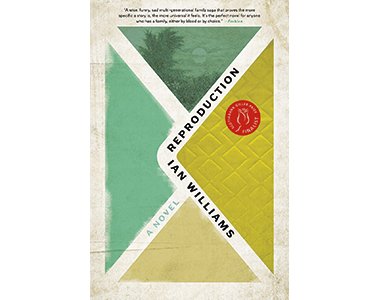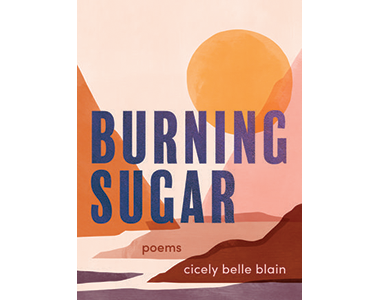
text that breaks
Reproduction by Ian Williams (Penguin Random House Canada) is a beautiful, chaotic and restless novel. Its main characters, Felicia and Edgar, meet in a hospital room shared by their dying mothers. They have a child together, and Felicia struggles to keep their son, Armistice, from turning into his arrogant absentee father so she raises him in the same house as a divorced man named Oliver and his two children, Heather and Hendrix. The group bonds living under the same roof, but tensions arise—assault, disease, death and birth—and shape what becomes an unconventional family. Williams infuses the novel with diary entries, lists, text messages, letters and chapters of pure dialogue. There is a “sex talk” that spans decades interspersed throughout the novel and a script for an imaginary episode of The Maury Povich Show. The structure of the novel is meant to mimic reproduction: Part 1 is divided into 23 sections (the number of chromosome pairs found in DNA) and Parts 2 and 3 continue to “reproduce” or break down into smaller sections. In Part 4, the text is noticeably broken. The text then presents reproduction in a new way—through cancer—as disconnected phrases spring out of sentences like tumours in subscript and superscript. Although the novel is enthralling and entertaining, it becomes a bit exhausting trying to keep up. Reconciling multiple meanings within a sentence is a workout for the brain. However, Ian Williams shows stunning creativity with Reproduction and shows us that “family” shapes who we are—whether we like it or not.
Written and published on geist.com and in issue 114.
*

everything on earth
Cicely Belle Blain’s debut collection of poetry, Burning Sugar (Arsenal Pulp Press), is a deeply personal exploration of racism, resilience, rage, and joy. In three parts, “Place,” “Art” and “Child,” Blain reflects on displacement and belonging, art and activism, and experiencing queerness and anti-Black racism as a child. In “Place,” Blain titles poems by location: Dallas, London, Banjul, and Chilliwack (“Chilliwack,” a one-line poem states: “It’s just a Walmart”). In “North Carolina,” Blain sees a whipping post and is “almost disappointed by how dull it is,” after expecting to feel a “haunting chill.” “Instead it stands there / in all its regularity and reticence / with no stories to share / as if all the violence of white supremacy / would simply fade with time.” In “Art,” Blain craves Black joy but often finds Black pain in art and activism, noticing the overwhelming whiteness of art spaces (also spotted: kale snacks, man buns, chinos and Birkenstocks). “Child” covers Blain’s first queer memory and how white supremacy, organized religion, heteronormative narratives and other institutions impacted coming out. “It is not anything specific that silenced my queer truth. / It’s everything on Earth.” Blain’s vulnerability is a superpower that makes Burning Sugar sweet, painful, and powerful. I won’t spoil anything else; read the haunting collection to spend more time in Blain’s beautiful mind.
Written and published on geist.com and in issue 118.
*